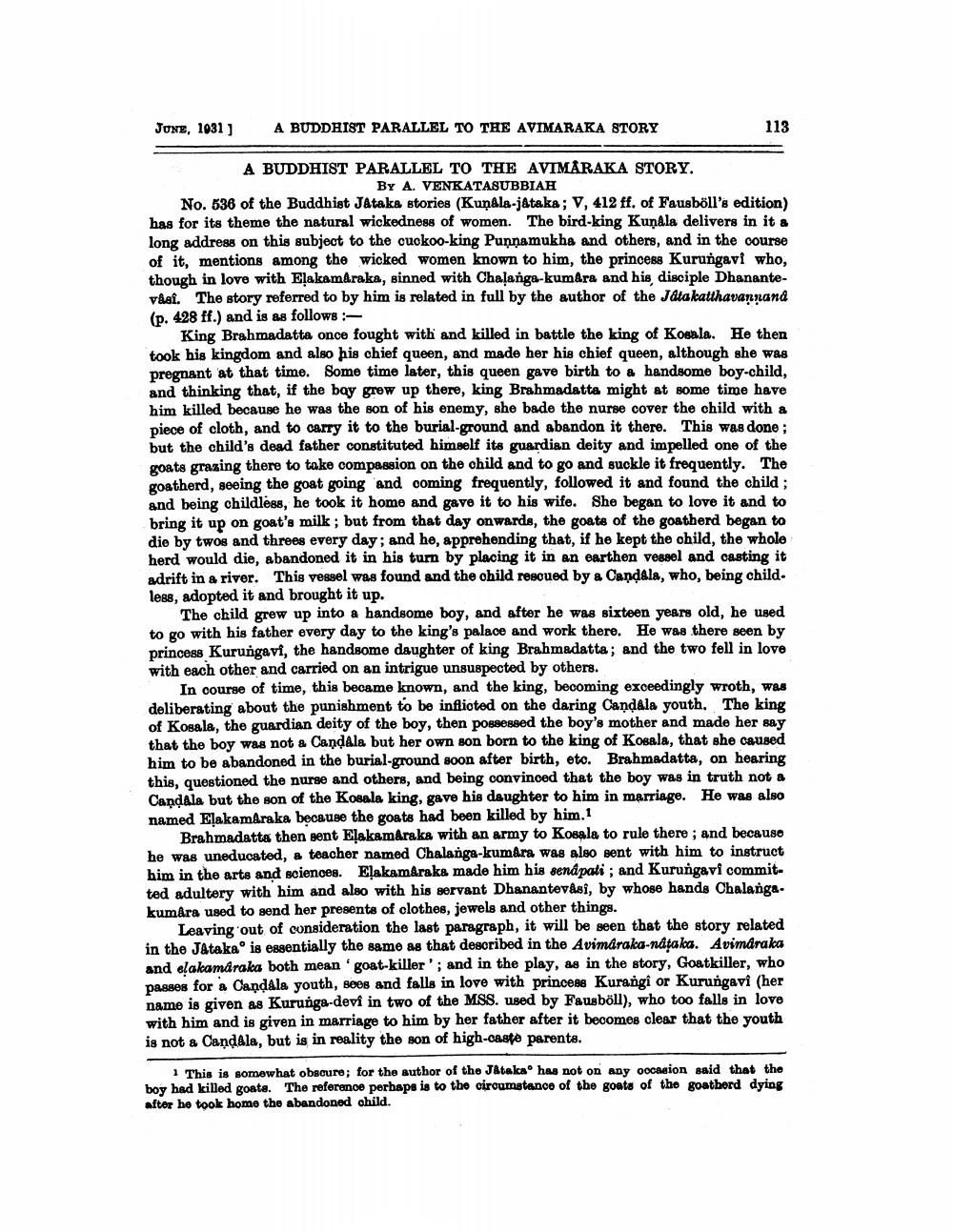________________
JUNE, 1931]
A BUDDHIST PARALLEL TO THE AVIMARAKA STORY
113
A BUDDHIST PARALLEL TO THE AVIMARAKA STORY.
BY A. VENKATASUBBIAH No. 538 of the Buddhist JAtaks stories (Kuņáls-jtaka; V, 412 ff. of Fausböll's edition) has for its theme the natural wickedness of women. The bird-king Kunala delivers in it & long address on this subject to the cuokoo-king Punnamukha and others, and in the course of it, mentions among the wicked women known to him, the princess Kurungavi who, though in love with Elakamaraka, sinned with Chalanga-kumara and his disciple Dhanantevåsi. The story referred to by him is related in full by the author of the Jatakatthavannand (p. 428 ff.) and is as follows:
King Brahmadatta once fought with and killed in battle the king of Kosala. He then took his kingdom and also his chief queen, and made her his chief queen, although she was pregnant at that time. Some time later, this queen gave birth to a handsome boy-child, and thinking that, if the bay grew up there, king Brahmadatta might at some time have him killed because he was the son of his enemy, she bade the nurse cover the child with a piece of cloth, and to carry it to the burial-ground and abandon it there. This was done ; but the child's dead father constituted himself its guardian deity and impelled one of the goats grazing there to take compassion on the child and to go and suckle it frequently. The goatherd, seeing the goat going and coming frequently, followed it and found the child ; and being childless, he took it home and gave it to his wife. She began to love it and to bring it up on goat's milk; but from that day onwards, the goats of the goatherd began to die by twos and threes every day; and he, apprehending that, if he kept the child, the whole herd would die, abandoned it in his turn by placing it in an earthen vessel and casting it adrift in a river. This vessel was found and the child rescued by a Candela, who, being child. less, adopted it and brought it up.
The child grew up into a handsome boy, and after he was sixteen years old, he used to go with his father every day to the king's palace and work there. He was there seen by princess Kurungavi, the handsome daughter of king Brahmadatta; and the two fell in love with each other and carried on an intrigue unsuspected by others.
In course of time, this became known, and the king, becoming exoeedingly wroth, W88 deliberating about the punishment to be inflicted on the daring Candala youth. The king of Kosala, the guardian deity of the boy, then possessed the boy's mother and made her say that the boy was not a Candala but her own son born to the king of Kosala, that she caused him to be abandoned in the burial-ground soon after birth, eto. Brahmadatta, on hearing this, questioned the nurse and others, and being convinced that the boy was in truth not a CandAla but the son of the Kosala king, gave his daughter to him in marriage. He was also named ElakamAraka because the goats had been killed by him. 1
Brahmadatta then sent Eļakamaraka with an army to Kosala to rule there, and because he was uneducated, a teacher named Chalanga-kumara was also sent with him to instruct him in the arts and sciences. Eļakamaraka made him his send pali; and Kurungavi committed adultery with him and also with his servant Dhanantovasi, by whose hands Chalanga. kumara used to send her presents of clothes, jewels and other things.
Leaving out of consideration the last paragraph, it will be seen that the story related in the JAtakaois essentially the same as that described in the Avimaraka-nataka. Avimdraka and slakamaraka both mean 'goat-killer'; and in the play, as in the story, Goatkiller, who passes for a Candela youth, seo8 and falls in love with princess Kurangi or Kurungavi (her name is given as Kurunga-devi in two of the MSS. used by Fausböll), who too falls in love with him and is given in marriage to him by her father after it becomes clear that the youth is not a Candala, but is in reality the son of high-caste parents.
1 This is somewhat obscure; for the author of the Jatakao has not on any cocacion said that the boy had killed goata. The reference perbaps is to the circumstance of the goats of the goatbord dying after he took home the abandoned child.




